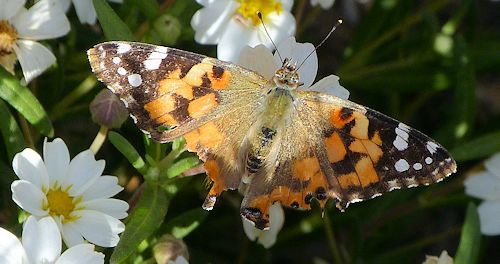Growing Melampodium leucanthum:
Black Foot Daisy
Description
Form: Mound forming, herbaceous stems on a woody base.
Lifespan: Perennial.
Leaf retention: Evergreen in temperatures above freezing.
Growth rate: Moderate.
Mature Size: 1' (30cm) high and 2' (60cm) wide.
Flowers: 8-10 broad white rays notched at the tip, with a small yellow central disk having a honey-like fragrance, 1-1.5" (2.5-3.8cm) wide.
Bloom: Spring through fall.
Fruit: A seed, found at the base of each ray, not within the center disk.
Leaves: Green, narrowly linear to lance-shaped.
Stems: Green, many-branched, becoming woody at the base with age.
Roots: This plant develops a long taproot and is difficult to transplant once established.
Wildlife: The flowers attract insects and, on occasion, butterflies. The seeds attract birds.
Toxic / Danger: No.
Origin: Arizona, Colorado, Kansas through Texas and Mexico.
Form: Mound forming, herbaceous stems on a woody base.
Lifespan: Perennial.
Leaf retention: Evergreen in temperatures above freezing.
Growth rate: Moderate.
Mature Size: 1' (30cm) high and 2' (60cm) wide.
Flowers: 8-10 broad white rays notched at the tip, with a small yellow central disk having a honey-like fragrance, 1-1.5" (2.5-3.8cm) wide.
Bloom: Spring through fall.
Fruit: A seed, found at the base of each ray, not within the center disk.
Leaves: Green, narrowly linear to lance-shaped.
Stems: Green, many-branched, becoming woody at the base with age.
Roots: This plant develops a long taproot and is difficult to transplant once established.
Wildlife: The flowers attract insects and, on occasion, butterflies. The seeds attract birds.
Toxic / Danger: No.
Origin: Arizona, Colorado, Kansas through Texas and Mexico.
Cultivation and Uses
USDA hardiness zones: 5-10. The green leaves and stems of this plant are hardy to 30°F (-1.1°C). The roots survive to -20°F (-29°C).
Heat tolerant: Yes.
Drought tolerant: Yes.
Sun: Full sun.
Planting: Locate Black Foot Daisy in full sun and unamended, well draining soil. The only problem most people have with this plant is root rot due to poor soil drainage.
Soil: Well draining, dry, low organic content, pH 6.1-8.0 (slightly acidic to slightly alkaline). Fertilizing and extra water may increase blooms but shorten lifespan. It does best in unamended, dry, sandy or rocky soil.
Water once established: Once a month. Overwatering may reduce lifespan and can lead to root rot.
Prune: This plant may be cut back late winter to reduce legginess and remove dead and damaged stems. Deadheading flowers is unnecessary because it blooms continually.
Litter: Low.
Propagation: Seed, cuttings.
Uses: Ornamental.
USDA hardiness zones: 5-10. The green leaves and stems of this plant are hardy to 30°F (-1.1°C). The roots survive to -20°F (-29°C).
Heat tolerant: Yes.
Drought tolerant: Yes.
Sun: Full sun.
Planting: Locate Black Foot Daisy in full sun and unamended, well draining soil. The only problem most people have with this plant is root rot due to poor soil drainage.
Soil: Well draining, dry, low organic content, pH 6.1-8.0 (slightly acidic to slightly alkaline). Fertilizing and extra water may increase blooms but shorten lifespan. It does best in unamended, dry, sandy or rocky soil.
Water once established: Once a month. Overwatering may reduce lifespan and can lead to root rot.
Prune: This plant may be cut back late winter to reduce legginess and remove dead and damaged stems. Deadheading flowers is unnecessary because it blooms continually.
Litter: Low.
Propagation: Seed, cuttings.
Uses: Ornamental.
Comments
This long blooming, easy to grow plant is a member of the Acanthus family (Acanthaceae). Another common name is Plains Blackfoot. The butterfly is a Painted Lady.
Do you have additional information or a different experience for these plants that you would like to share? Email info@GardenOracle.com. All contributions are welcome and appreciated.
This long blooming, easy to grow plant is a member of the Acanthus family (Acanthaceae). Another common name is Plains Blackfoot. The butterfly is a Painted Lady.
Do you have additional information or a different experience for these plants that you would like to share? Email info@GardenOracle.com. All contributions are welcome and appreciated.


Latest update: May, 2021
© 2008-2026 by GardenOracle.com

